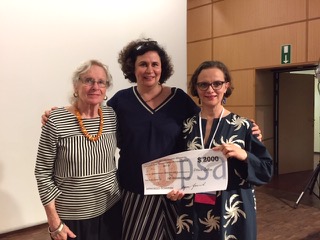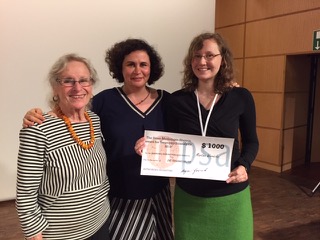In honor of the special friendship of three men – Alfred Pritchard Sloan, William Clare Menninger and Karl Augustus Menninger – and in honor of Howard Shevrin, who died in Ann Arbor on January 18, 2018, annual prizes are awarded to an emerging researcher and an established researcher.
2019
In making this award, priority was given to research paradigms that connected to empirically testable areas of Freudian classical metapsychology. The winners, Vittorio Gallese (established researcher) and Martina Wernicke (emerging researcher), were announced on the 20th of July in the presence of Aliza Shevrin.
Vittorio Gallese
Vittorio Gallese is currently professor of Psychobiology at the University of Parma, Italy. He was visiting professor at various prestigious universities, and has an impressive publication record.
Gallese’s research deals with neurophysiology, cognitive neuroscience, social neuroscience, and philosophy of mind. His major scientific contributions are the discovery of mirror neurons together with his colleagues in Parma, and the development of a new unified model of perception and intersubjectivity known as Embodied Simulation Theory. Through his empirical investigation of the neural basis of social cognition, Vittorio Gallese has made a great contribution in shedding new light on the role of the body in the development of the bodily self, not only in relation to more common intersubjective situations, but also in relation to psychopathological disorders such as schizophrenia, autism, and eating disorders. His theoretical and empirical investigation of embodied cognition has also been applied to aesthetics and language.
The importance for psychoanalysis of Gallese’s mirror neuron theory, and in particular the idea that language understanding goes through a mechanism for recognizing actions made by others, cannot be overestimated. This system, first discovered in the precursor of Broca’s area, shows how being into language activates the proper language motor areas, and that speech understanding is close to action representation. What is mentally effective is also heavily organized along motor organizational lines: the mental world of a subject is the result of its action intentions and not the mere product of the imprinting of impressions. This account allows for an understanding of the Freudian word presentation and the Lacanian signifier as a phonemic motor fragment, leading, then, to applying motor logics to the mental, including action prediction and predictive attenuation (coding). The epistemological potential of the idea that the representational, mental world is grounded in sensorimotor patterns – the importance of which cannot be underestimated for (Freudian and Lacanian) psychoanalysis – is huge, and there is no doubt that Gallese is one of the most prominent figures to have promoted it, thereby realizing a close connection between the neurosciences, psychoanalysis and philosophy.
Martina Wernicke
Martina Wernicke is a psychologist who works in the field of experimental neuroscience. After defending her thesis “Approaching Consciousness with Masked Priming” in 2014, she started training as a psychological psychotherapist and began working in the field of paraphilia. In 2018 she joined Prof. Dr. Kristian Folta-Schoofs’ “Neurodidactics & NeuroLab” at the University of Hildesheim. For the past 10 years she has also worked in socio-psychiatric assistance and counselling.
The study “Neural correlates of subliminally presented visual sexual stimuli” (Wernicke et al., 2017) reveals differences in the processing of preferred versus non-preferred, as well as explicit versus non-explicit sexual stimuli. Performances in an objective visibility test indicate that especially preferred explicit stimuli are more likely to reach consciousness. Taking into account recent literature, hemodynamic responses to these stimuli shed light on this process.
2020
The 2020 winners of the Sloan-Menninger-Shevrin Prizes were Linda Brakel (established researcher) and Tali Marron (emerging researcher). The 2021 prizes were possible thanks to gracious gifts from Mr Bob Berry.
Linda A.W. Brakel
 Linda A.W. Brakel’s official training is as a psychiatrist/psychoanalyst, but she has developed a keen interest in interdisciplinary work over the last several decades. She has done empirical experimental work regarding the primary processes, developing a simple-to-use independent measure of primary versus secondary processes, the GeoCat. She has investigated primary processes in non-human animals, in an evolutionary biology context. Professor Brakel has also engaged in fields cognate to psychoanalytic theory, notably the philosophy of mind, and the philosophy of action. Lately she has become interested in Experimental Philosophy, and not merely because of its cool nickname – X-Phi. Linda A.W. Brakel is the author of many articles, three co-written books, and four solo books – Philosophy, Psychology and the A-Rational Mind (OUP, 2009); Unconscious Knowing and Other Essays in Psycho-Philosophical Analysis (OUP, 2010); The Ontology of Psychology (Routledge, 2013); and Investigations into the Trans Self and Moore’s Paradox (Palgrave-Macmillan, 2021).
Linda A.W. Brakel’s official training is as a psychiatrist/psychoanalyst, but she has developed a keen interest in interdisciplinary work over the last several decades. She has done empirical experimental work regarding the primary processes, developing a simple-to-use independent measure of primary versus secondary processes, the GeoCat. She has investigated primary processes in non-human animals, in an evolutionary biology context. Professor Brakel has also engaged in fields cognate to psychoanalytic theory, notably the philosophy of mind, and the philosophy of action. Lately she has become interested in Experimental Philosophy, and not merely because of its cool nickname – X-Phi. Linda A.W. Brakel is the author of many articles, three co-written books, and four solo books – Philosophy, Psychology and the A-Rational Mind (OUP, 2009); Unconscious Knowing and Other Essays in Psycho-Philosophical Analysis (OUP, 2010); The Ontology of Psychology (Routledge, 2013); and Investigations into the Trans Self and Moore’s Paradox (Palgrave-Macmillan, 2021).
Tali Marron
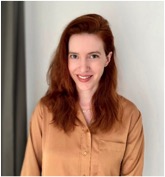 Dr Tali R. Marron is a clinical psychologist, working with children and adolescents at the Shalvata Mental Health Center (Israel), and in a private clinic in Tel-Aviv. Tali completed her PhD at Bar-Ilan University under the supervision of Professor Miriam Faust and Dr Ety Berant. Her PhD title was Neurobehavioral investigation of free associations: The relation between psychodynamic therapy and verbal creativity, and her research constitutes an in-depth investigation of Freudian concepts, specifically of free association, through high-end brain imaging techniques and therapeutic protocols. In her dissertation she used fMRI brain imaging to shed light on the neural mechanisms of free association and on the role of free association in creativity and in therapeutic processes. Several articles based on her dissertation research have since been published. Tali is an active member in the Israeli Neuropsychoanalysis group and a member of the International Neuropsychoanalysis Society.
Dr Tali R. Marron is a clinical psychologist, working with children and adolescents at the Shalvata Mental Health Center (Israel), and in a private clinic in Tel-Aviv. Tali completed her PhD at Bar-Ilan University under the supervision of Professor Miriam Faust and Dr Ety Berant. Her PhD title was Neurobehavioral investigation of free associations: The relation between psychodynamic therapy and verbal creativity, and her research constitutes an in-depth investigation of Freudian concepts, specifically of free association, through high-end brain imaging techniques and therapeutic protocols. In her dissertation she used fMRI brain imaging to shed light on the neural mechanisms of free association and on the role of free association in creativity and in therapeutic processes. Several articles based on her dissertation research have since been published. Tali is an active member in the Israeli Neuropsychoanalysis group and a member of the International Neuropsychoanalysis Society.
2021
The 2021 winners of the Sloan-Menninger-Shevrin Prizes were Michael Anderson (established researcher) and Gerd Waldhauser (emerging researcher). The 2021 prizes were made possible thanks to gracious gifts from Mr Bob Berry and Mrs Aliza Shevrin.
Michael Anderson
As members of our Society will know, Mike Anderson is the world authority on ‘motivated’ or active forgetting – a field that has enormous overlap with the classical analytic concept of repression. Professor Anderson is a Senior scientist and programme leader at the MRC Cognition and Brain Sciences Unit at the University of Cambridge, where he studies the cognitive and neural mechanisms underlying forgetting in long-term memory. He has been at the heart of re-energising the classical analytic topic of repression, and the related concept of defence. He has investigated these phenomena at the behavioural, subjective experience and the neurobiological level, and in doing so has been extremely influential in a number of ways. He is a wonderful winner of a prize aimed at better understanding the metapsychology and the brain basis of core psychoanalytic concepts such as repression.
Gerd Waldhauser
 Gerd Waldhauser studied psychology and some philosophy at Saarland University, Germany, earning his MA with a thesis on the experimental investigation of repression and subsequently completing a PhD on the electrophysiological correlates of memory inhibition at Lund University, Sweden. Since then he has aimed at bridging the gap between psychodynamic therapy and basic research. In his research as a cognitive neuroscientist, first at the University of Konstanz and now at Ruhr University Bochum, Gerd employs EEG/MEG, fMRI and TMS to investigate the neural dynamics of memory intrusions and memory control in connection to clinical disorders and psychoanalytic concepts such as repression and defense. In the applied field, he has received training in forensic psychiatry, has worked with psychosomatic inpatients suffering from posttraumatic stress disorder, and is now practicing psychoanalysis in private practice as a training candidate of the German Psychoanalytic Association.
Gerd Waldhauser studied psychology and some philosophy at Saarland University, Germany, earning his MA with a thesis on the experimental investigation of repression and subsequently completing a PhD on the electrophysiological correlates of memory inhibition at Lund University, Sweden. Since then he has aimed at bridging the gap between psychodynamic therapy and basic research. In his research as a cognitive neuroscientist, first at the University of Konstanz and now at Ruhr University Bochum, Gerd employs EEG/MEG, fMRI and TMS to investigate the neural dynamics of memory intrusions and memory control in connection to clinical disorders and psychoanalytic concepts such as repression and defense. In the applied field, he has received training in forensic psychiatry, has worked with psychosomatic inpatients suffering from posttraumatic stress disorder, and is now practicing psychoanalysis in private practice as a training candidate of the German Psychoanalytic Association.2022
The 2022 winners of the Sloan-Menninger-Shevrin Prizes were François Ansermet and Pierre Magistretti (established researcher) and Thomas Rabeyron (emerging researcher). The 2022 prizes were made possible thanks to gracious gifts from Mr Bob Berry and Mrs Aliza Shevrin.
François Ansermet and Pierre Magistretti
François Ansermet, Professor Emeritus of Child and Adolescent Psychiatry at the University of Geneva and at the University of Lausanne, former Director of the Department of psychiatry, University of Geneva, former Head of the Department of Child and Adolescent Psychiatry, University Hospital of Geneva and psychoanalyst, member of the Word Association of Psychoanalysis. Pierre Magistretti is Distinguished Professor at the Division at Biological and Environmental Sciences and Engineering at KAUST, Saudi Arabia. He is also Professor Emeritus at the Brain Mind Institute at the École Polytechnique Fédérale de Lausanne (EPFL) and at the Departments of Psychiatry at Université Lausanne/Centre Hospitalo-Universitaire Vaudois (UNIL/CHUV) and at Université de Genève (UNIGE). Pierre Magistretti’s laboratory has discovered some of the cellular and molecular mechanisms that underlie the coupling between neuronal activity and energy consumption by revealing the key role that glial cells, in particular astrocytes, play in this physiological process. These findings are particularly relevant for understanding the origin of the signals detected by functional brain imaging, and are revealing a role of astrocytes in neuronal plasticity and neuroprotection. François Ansermet and Pierre Magistretti created the Agalma Foundation in Geneva (www.agalma.ch), which aims to study the links between the neurosciences and psychoanalysis, as well as links between the arts, sciences and psychoanalysis. Together they have written two books on the subject “A Chacun son Cerveau” (2004) and “Les Enigmes du Plaisir” (2010). In “Biology of Freedom” (the English translation of the first book), they defend the idea that we are biologically determined to be free: thanks to our brain plasticity our brain are highly individual or singular, and the traces which sculpt this singularity are, in their view, equivalent to the Lacanian ‘signifiers’. They have published together on psychoanalysis and neurosciences, the trace and the drives, somatic markers and desires and were proclaimed as a pair.
Thomas Rabeyron
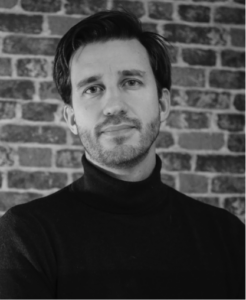 Thomas Rabeyron is a clinical psychologist and a professor of clinical psychology and psychopathology at the university of Lorraine (Nancy), Director of the Interpsy Lab, and an Honorary Research Fellow at the University of Edinburgh. In 2009 he co-founded the Center for Information, Research and Counseling for Exceptional Experiences (CIRCEE), of which he is director of the counseling service. His research focuses on the clinic aspects of exceptional experiences, neuropsychoanalysis and the evaluation of psychoanalytic psychotherapies. Laureate of the Institut Universitaire de France as a junior member in 2021, he has published over sixty scientific papers and two books about clinical psychology (Psychologie clinique et Psychopathologie, Armand Colin, 2018) and exceptional experiences (Clinique des expériences Exceptionnelles, Dunod, 2020). In the domain of neuropsychoanalysis he proposes a parallel between the free energy concept and the Freudian death drive, and considers that failures of reducing free energy at different levels correspond with different forms of psychopathology.
Thomas Rabeyron is a clinical psychologist and a professor of clinical psychology and psychopathology at the university of Lorraine (Nancy), Director of the Interpsy Lab, and an Honorary Research Fellow at the University of Edinburgh. In 2009 he co-founded the Center for Information, Research and Counseling for Exceptional Experiences (CIRCEE), of which he is director of the counseling service. His research focuses on the clinic aspects of exceptional experiences, neuropsychoanalysis and the evaluation of psychoanalytic psychotherapies. Laureate of the Institut Universitaire de France as a junior member in 2021, he has published over sixty scientific papers and two books about clinical psychology (Psychologie clinique et Psychopathologie, Armand Colin, 2018) and exceptional experiences (Clinique des expériences Exceptionnelles, Dunod, 2020). In the domain of neuropsychoanalysis he proposes a parallel between the free energy concept and the Freudian death drive, and considers that failures of reducing free energy at different levels correspond with different forms of psychopathology.
2023
The 2023 winners of the Sloan-Menninger-Shevrin Prizes were Cristina Alberini (established researcher) and Jessica Tran The (emerging researcher). The 2023 prizes were made possible thanks to gracious gifts from Mr Bob Berry and Mrs Aliza Shevrin.
Cristina Alberini
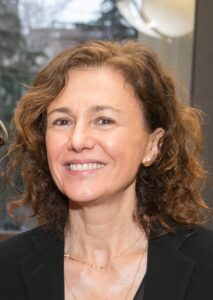 Cristina Alberini is currently Julius Silver, Roslyn S. Silver & Enid Silver Winslow Professor of Neuroscience at the Center for Neural Science, New York University. Alberini received her PhD in Immunological Sciences from the University of Genoa (Italy), and then trained in neurobiology as a post-doctoral fellow at Columbia University with Eric Kandel. From 1997-2000 she was an Assistant Professor in the Department of Neuroscience at Brown University and then Associate and Full Professor at Mount Sinai School of Medicine in New York from 2001 to 2011. In 2011 she joined the Center for Neural Science at New York University. Alberini trained as a psychoanalyst at NPAP in New York starting in 2002 and became licensed in the state of NY in 2012. Alberini’s research is focusing on elucidating the molecular and brain plasticity mechanisms underlying long-term memory formation and retrieval using rodent models. Her studies target different ages of the lifespan with particular attention to the understanding of the temporal window during which memories are fragile and therefore can be strengthened or weakened. Two of these temporal windows are called consolidation and reconsolidation, which, respectively, take place after learning and memory recalls. Understanding the features of these processes and their underline mechanisms is key for understanding how memories are laid out, change with new experience, and influence new behavior throughout life. Elucidating mechanisms of memory consolidation and reconsolidation also informs about when it is possible and optimal to employ certain interventions for therapeutic purposes. Alberini’s studies on memory processes have been of interest in psychoanalysis because the goal of the therapeutic process is to help the subject to become aware (or conscious) of the underlying sources of his or her unconscious behavior, both intellectually and emotionally, by re-experiencing them and by redirecting the emotions toward the analyst and then reprocessing them in a new mode. Thus, remembering and elaborating memories in the new analytic setting, via processes of new learning, consolidation and in certain cases reconsolidation, is a key component of the psychoanalytic process, whether used to learn about the mind and its functioning or to alleviate disturbances in therapeutic processes. A more recent research focus for Alberini, which has sparked from her psychoanalytic training, is the understanding of the mechanisms underlying learning and memory in infancy. Her hypothesis is that the unconscious forms through early developmental experiences, which biologically and structurally shape the developing brain. Her work has shown, in fact, that early life experiences, despite being rapidly apparently forgotten, result in persistent biological maturation of the brain through specialized modifications that stored memories up to adulthood and guide adult behavior. These special biological changes taking place through in early life learning occur within a critical period, which guide the development of the abilities to learn and remember. The results of Alberini’s lab studies also provide information for developing potential therapeutics against cognitive impairments and psychopathologies. Alberini received the Hirschl-Weill Career Scientist Award, NARSAD Independent Investigator Award, Golgi Medal, Athena Award, NIH MERIT Award, the 2018 Jacob K. Javits NYU Award, NYU Silver professorship, and was elected in 2022 Member of the American Academy of Arts and Sciences.
Cristina Alberini is currently Julius Silver, Roslyn S. Silver & Enid Silver Winslow Professor of Neuroscience at the Center for Neural Science, New York University. Alberini received her PhD in Immunological Sciences from the University of Genoa (Italy), and then trained in neurobiology as a post-doctoral fellow at Columbia University with Eric Kandel. From 1997-2000 she was an Assistant Professor in the Department of Neuroscience at Brown University and then Associate and Full Professor at Mount Sinai School of Medicine in New York from 2001 to 2011. In 2011 she joined the Center for Neural Science at New York University. Alberini trained as a psychoanalyst at NPAP in New York starting in 2002 and became licensed in the state of NY in 2012. Alberini’s research is focusing on elucidating the molecular and brain plasticity mechanisms underlying long-term memory formation and retrieval using rodent models. Her studies target different ages of the lifespan with particular attention to the understanding of the temporal window during which memories are fragile and therefore can be strengthened or weakened. Two of these temporal windows are called consolidation and reconsolidation, which, respectively, take place after learning and memory recalls. Understanding the features of these processes and their underline mechanisms is key for understanding how memories are laid out, change with new experience, and influence new behavior throughout life. Elucidating mechanisms of memory consolidation and reconsolidation also informs about when it is possible and optimal to employ certain interventions for therapeutic purposes. Alberini’s studies on memory processes have been of interest in psychoanalysis because the goal of the therapeutic process is to help the subject to become aware (or conscious) of the underlying sources of his or her unconscious behavior, both intellectually and emotionally, by re-experiencing them and by redirecting the emotions toward the analyst and then reprocessing them in a new mode. Thus, remembering and elaborating memories in the new analytic setting, via processes of new learning, consolidation and in certain cases reconsolidation, is a key component of the psychoanalytic process, whether used to learn about the mind and its functioning or to alleviate disturbances in therapeutic processes. A more recent research focus for Alberini, which has sparked from her psychoanalytic training, is the understanding of the mechanisms underlying learning and memory in infancy. Her hypothesis is that the unconscious forms through early developmental experiences, which biologically and structurally shape the developing brain. Her work has shown, in fact, that early life experiences, despite being rapidly apparently forgotten, result in persistent biological maturation of the brain through specialized modifications that stored memories up to adulthood and guide adult behavior. These special biological changes taking place through in early life learning occur within a critical period, which guide the development of the abilities to learn and remember. The results of Alberini’s lab studies also provide information for developing potential therapeutics against cognitive impairments and psychopathologies. Alberini received the Hirschl-Weill Career Scientist Award, NARSAD Independent Investigator Award, Golgi Medal, Athena Award, NIH MERIT Award, the 2018 Jacob K. Javits NYU Award, NYU Silver professorship, and was elected in 2022 Member of the American Academy of Arts and Sciences.
Jessica Tran The
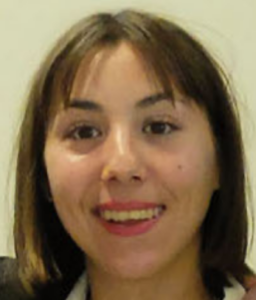 Jessica Tran The is a clinical psychologist, lecturer at the University of Caen in the Unité Inserm 1077 “Neuropsychologie et neuroimagerie de la mémoire humaine” (Neuropsychology and neuroimaging of human memory). After studying psychology at the University of Paris 7, and philosophy at the École Normale Supérieure de Paris, she completed her thesis under a joint supervision coordinated between the Centre de Recherches Psychanalyse, Médecine et Société (Paris Cité) and the Faculty of Biology and Medicine of the University of Lausanne, under the direction of professors François Ansermet and Alain Vanier. Jessica Tran The continued her postdoctoral research at the Agalma Foundation in Geneva, where she is currently an associate researcher. Her fields of study focus on the dialogue between psychoanalysis and neuroscience from both an epistemological and a clinical perspective, with particular attention to the applications of this dialogue in the psychopathology of psychosis. Jessica Tran The combines this theoretical work with her clinician practice in adult psychiatry. Within the Unité Inserm 1077, she is currently working on the “November 13” programme, studying the impact of the 2015 attacks in Paris on individual and collective memory.
Jessica Tran The is a clinical psychologist, lecturer at the University of Caen in the Unité Inserm 1077 “Neuropsychologie et neuroimagerie de la mémoire humaine” (Neuropsychology and neuroimaging of human memory). After studying psychology at the University of Paris 7, and philosophy at the École Normale Supérieure de Paris, she completed her thesis under a joint supervision coordinated between the Centre de Recherches Psychanalyse, Médecine et Société (Paris Cité) and the Faculty of Biology and Medicine of the University of Lausanne, under the direction of professors François Ansermet and Alain Vanier. Jessica Tran The continued her postdoctoral research at the Agalma Foundation in Geneva, where she is currently an associate researcher. Her fields of study focus on the dialogue between psychoanalysis and neuroscience from both an epistemological and a clinical perspective, with particular attention to the applications of this dialogue in the psychopathology of psychosis. Jessica Tran The combines this theoretical work with her clinician practice in adult psychiatry. Within the Unité Inserm 1077, she is currently working on the “November 13” programme, studying the impact of the 2015 attacks in Paris on individual and collective memory.2024
The 2024 winners of the Sloan-Menninger-Shevrin Prizes were Mark Solms (established researcher) and Caitlin Ware (emerging researcher). The 2024 prizes were made possible thanks to gracious gifts from Mr Bob Berry and Mrs Aliza Shevrin.
Mark Solms
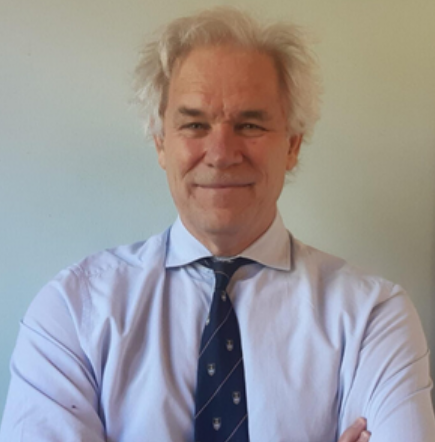 Mark Solms is Mark Solms, Ph.D., is the Co-Chair (with Cristina Alberini) of the International Neuropsychoanalysis Society. He is a member of the British Psychoanalytical Society, and the South African and American Psychoanalytic Associations. He is also Science Director of APsaA. He coined the word ‘neuropsychoanalysis’ in 1998, and has been a major contributor to the development of this field. He is a Full Professor and the Director of Neuropsychology at the Neuroscience Institute of the University of Cape Town, South Africa.
Mark Solms is Mark Solms, Ph.D., is the Co-Chair (with Cristina Alberini) of the International Neuropsychoanalysis Society. He is a member of the British Psychoanalytical Society, and the South African and American Psychoanalytic Associations. He is also Science Director of APsaA. He coined the word ‘neuropsychoanalysis’ in 1998, and has been a major contributor to the development of this field. He is a Full Professor and the Director of Neuropsychology at the Neuroscience Institute of the University of Cape Town, South Africa.
Caitlin Ware
 Caitlin Ware is a Franco American psychologist, researcher, and lecturer. She obtained her PhD in psychoanalysis and psychopathology from the University of Paris Cité on the subject of Alzheimer’s and bilingualism under the supervision of Pr Emeritus Paul-Laurent Assoun. She currently conducts research at the Broca Living Lab in Paris.
Caitlin Ware is a Franco American psychologist, researcher, and lecturer. She obtained her PhD in psychoanalysis and psychopathology from the University of Paris Cité on the subject of Alzheimer’s and bilingualism under the supervision of Pr Emeritus Paul-Laurent Assoun. She currently conducts research at the Broca Living Lab in Paris. 